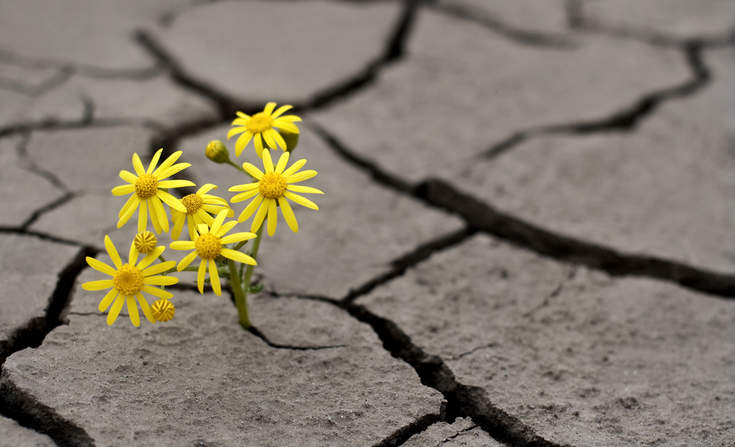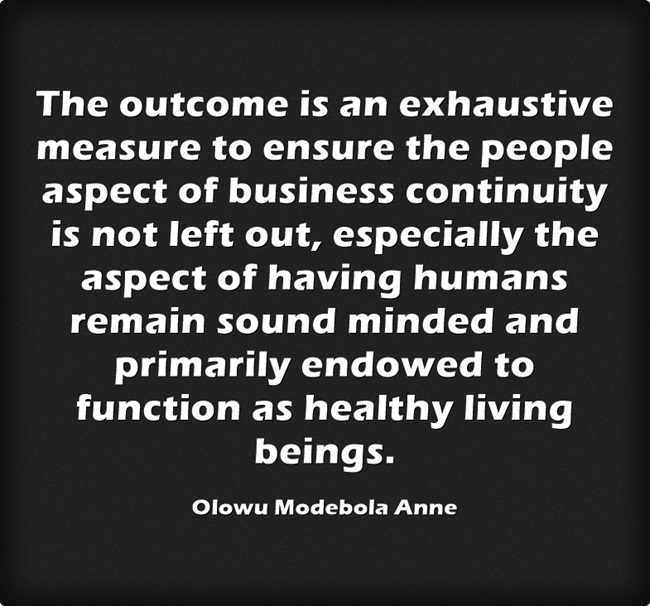
By Olowu Modebola Anne
We all agree that human-beings are the greatest asset of any organization, because no matter the age of automation, even as an AI enthusiast there is still a need for people. So, it will be safe to say that no organisation can function without its people.
Although, traditionally, business continuity focuses a lot on technology and premises, the people-centric approach to business continuity is a wave of power to ensure people stay as relevant as the need for technology to make life easier and for their work to be seamless. This ensures the safety of technology, premises and equipment in case of fire, vandalism, theft, etc. The outcome is an exhaustive measure to ensure the people aspect of business continuity is not left out, especially the aspect of having humans remain sound minded and primarily endowed to function as healthy living beings.
Register for Tekedia Mini-MBA edition 19 (Feb 9 – May 2, 2026): big discounts for early bird.
Tekedia AI in Business Masterclass opens registrations.
Join Tekedia Capital Syndicate and co-invest in great global startups.
Register for Tekedia AI Lab: From Technical Design to Deployment (begins Nov 15th).
As such, we always drive this home during our awareness sessions for employees to embed the business continuity culture into their lifestyles and homes. Just before I start any session, below are my usual ice breakers and I would advise you answer them sincerely within yourself.
- Do you have a fully functional fire extinguisher (FE) in your car/house (not the unmaintained and un-serviced one’s you have for FRSC/facilities décor)
- Do you have more than one exit in your house?
- Do you know the fire exits at your work place?
- Do you even have a will?
- Do you have a travel plan/guide?
- And my favourite, there is a sudden Class B fire in your abode, and you only have the opportunity to save two valuable things (a human and an item), who and what would you save?
Murphy’s Law states that “whatever can go wrong, will go wrong”: so the possibility of something going wrong means it can happen! Simply, I really don’t need to bring in to this article examples of incidents that pick on the questions above, the events that have occurred over the years and the causalities or losses involved.

So, should you have fully functional fire extinguishers at your comfort? Yes, please you should. During my sessions, I have heard a lot of positive testimonials on how having one had saved families from fire disasters arising from their cars, kitchens, the generators or any of our day to day appliances. In fact, of particular accolades were the ones from men that had to quickly run to their vehicles to get FEs to put off uprising fire from their homes.
It is also very crucial to have more than one exit in your house, a minimum of two is always advised, for your own safety, having another exit has saved a lot of people from armed robbery, fire and all sorts of emergencies.
The third question is a fun fare for me when I ask, as many always get carried away with work, and totally forget about the exits available to them at their primary work stations. Ask your fire wardens and never miss out on your fire drills.
The ‘will’ or testament thing also causes commotion and all sorts of responses that make me smile all the time. As a continuity specialist, I thoroughly advise you to have one, if you truly care about anything, or anyone.
Yes, the travel plan is also a bit dicey as many Nigerians practice this without knowing they have activated a business continuity plan for themselves and their families a long time ago. I know of a family of six (6) that never travel together; so while the mum travels with the boys in a separate vehicle, the father travels with the girls in another one. I also know of a family of four (4) who do this by air all the time. One of my uncle’s predominantly never allows all his kids travel via the same route. So, a lot of families have different styles and travel plans to ensure the continuity of their heritages.

The 6th question is largely subjective, while some men will say their wives or sons and women vice versa, certificates, HD TV’s etc. for items to be retrieved, it is purely based on your own preference, and there is no perfect answer. The objective of the question is to mentally prepare you and have you picture yourself in that scenario.
How to apply Business Continuity to Your Home & Lifestyle.
- Always have a Plan B
As cliché as this may sound, there’s nothing wrong with ever having a plan B. It is even in fact totally wrong not to have one, no matter the situation; having another option is a very proactive gesture, of course, except in the case of your marital spouse.
- Wear the Situational Awareness Cap
There’s a funny adage that looks into how a chicken acts when it’s introduced to another environment. It quickly drops only one of its legs on the ground and when it’s convinced it’s safe, it comfortably drops the other one. The lesson is to observe and not be too comfortable all the time; watch your surroundings, soak them in, if possible ask questions, and always remember your safety comes first in any situation.
- Save for the future
Finance and the importance of saving have been here before the age of banks. I remember reading ‘Alawiye’ with stories of farmers and hunters digging holes in the ground to save their cowries and coins. So, even in modern times that things have changed, the importance of saving for the rainy day and in this case emergencies as I will put it, is very essential. You never know what the funds will help you to save or protect, as a risk management professional. I would say, it’s really just advisable to always save, even though you may not know what you might be saving for, just yet.
- Have a travel plan or Fall back plan
I remember vividly well, how my dad used to gather us round whenever we were together to remind us of our fall back plans as a family: who we should and can meet for help during incidents, how to get to another country if Nigeria were to be on fire, how to defend ourselves and how we were to take responsibilities for each other. Our fall back plan was also always tested: I remember during the January 2012 Occupy Nigeria / Subsidy crisis, how he was quick to get us to our country home to avoid he major crisis and hullabaloo in the city, especially in two separate vehicles, even though my dad never knew he had invoked our family’s BCP as at then. So, it’s quite practical and useful.
- Always be mentally alert i.e.( Always smell the cheese)
Monitor the changes around you, in your homes, your work places and even in your health, pay attention to your body and mind. Yes, ensure you are sound mentally, physically, emotionally, spiritually, psychologically, etc. Alan walker’s ‘On my way’ has a verse I love so much, which goes, ‘Nobody, but me can keep me safe and I’m on my way’. So, either it’s your job or your family or you staying alive and relevant as an entity, it’s of paramount care that you stay mentally alert.
- Think, Exit! Exit! Exit!
I remember entering a beautiful family restaurant with my friend one evening and he had to call my attention back to our conversation, asking why my eyes were wandering round the corners. I apologized, telling him I was watching out for all the possible exits in the 4.5 star restaurants; he was stunned. He shockingly told me it never even occurred to him to observe his environment, let alone the exits. It was a live restaurant, which made it even more porous to fire, so there was no way in hell that I wouldn’t put my operational risk skills to action.
When one encounters any problem in life, the first thing that comes to mind is how to get out of it: Exit! Exit! Exit! Just to continue to live on, you know the popular lines, Live to die another day! Eventually incidents, mishaps, emergencies and crisis do happen, especially when we all least expect, even though individuals in my fields forecast it and prepare for it, we really can’t accurately tell the time it will occur. We all just know when it happens we are prepared to handle it. So, here’s a live one for us all to imbibe: it’s an organization we all work for, wither owned by us and or someone else or the government, but in all we are only truly accountable to ourselves and those that love us.
Our organizations need us to stay alive to function at par and so do our loved ones, let’s all have the resilience culture.



